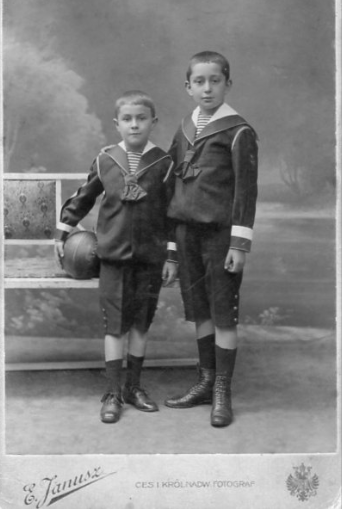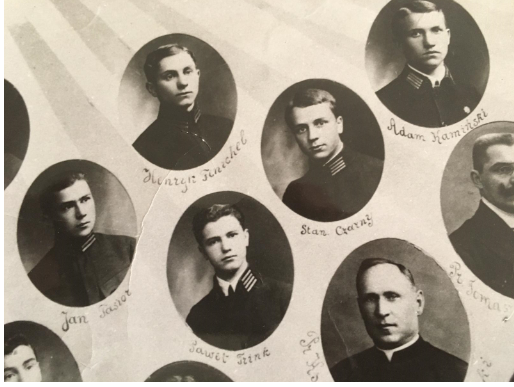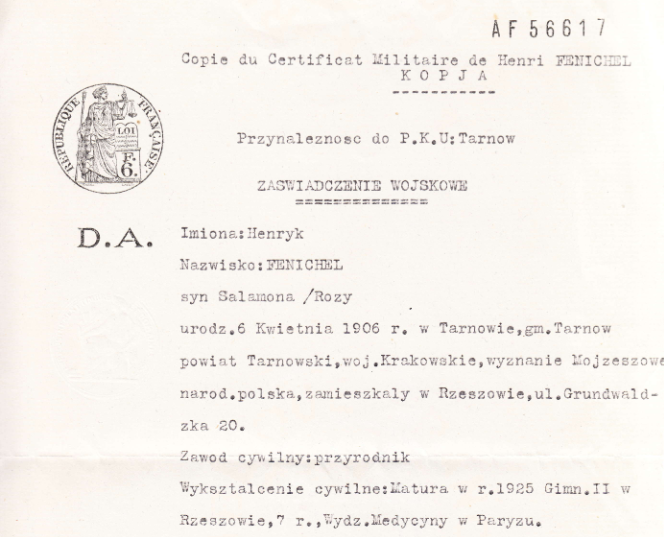Fenichel Family
About Author

My name is Rozalia Grechuta. I am 15 years old and I am a student of High School no. 1 in Rzeszów. I am interested in history, alternative music and making jewelry. In my spare time I like reading good detective stories, crocheting and walking with my beloved dog. The project „My Rzeszów. Our Rzeszów” seemed to be a very interesting initiative, which during lockdown would allow me to discover many secrets of my city and spend my time productively.
Representatives of Fenichel Family: Patrick Fénichel and Arnaud Fénichel
In the project, I worked with two people: Arnaud Fénichel and his uncle Patrick. Henryk Fenichel, Patrick’s father and Arnaud’s grandfather, and his brother Emil lived in Rzeszów before the Second World War (their surnames contained then a letter “e”, not “é”). Both Patrick and Arnaud were born and raised in France.
Patrick Fénichel is 70 years old. He is a professor of gynecology and endocrinology and works at the university hospital in Nice, where he lives with his wife. He has four children. Despite the significant age difference, our cooperation was very good and Patrick always answered all my questions. Patrick also told various stories he had heard from his father, hoping that we would find something he had not had time to learn from his father. Henry Fenichel lived almost 100 years, so Patrick plans to write a book about him. A few years ago, Patrick went to Rzeszów himself in order to see the places where his father grew up.
Arnaud Fénichel is 41 years old and works as an archivist librarian for a private company. He lives in the southwestern suburbs of Paris. Arnaud became interested in the history of his family at the turn of 2017 and 2018. So far, he has managed to collect a lot of documents and photos. In his free time, Arnaud likes dancing and visiting art galleries. He was always supportive and understanding, which was helpful in organizing the work well. Due to the fact that Arnaud has extensive experience in conducting archival searches, my role was to check and find information that can only be found in person in Rzeszów.


What do Arnaud and Patrick Fénichel know about their family from Rzeszów?
Henryk Fenichel – Patrick’s father and Arnaud’s grandfather– was born on April 8, 1906 in Tarnów in the Jewish family of a textile merchant, Salomon Fenichel (born in 1877) and Róża Fränkel (born in 1881 or 1882). Salomon was the son of a merchant assistant from Tarnów, Jakob Fenichel (born in 1853) and Rachela born Feiwel (born in 1855) who got married in 1887. Salomon was one of his parents’ five children, but today we only know the names of his three siblings: Ester (she only lived one year), Lotte (she was murdered by the Nazis) and Mojzes (he had a son named Henryk, too)
Róża and Salomon got married in 1904, but they divorced around1910 and Róża, with Henryk and his older brother Emil (born in 1904), came to Rzeszów and lived there with Róża’s parents: Rela (born Weinberger) and Samuel Fränkel ( who died in 1918). Samuel and his brother traded a clothes affair. The family’s flat – as Patrick Fenichel emphasiz – was situated in the same building as Edward Janusz’s photo studio, probably on today’s Grunwaldzka Street 18.
According to Patrick’s stories, at the outburst of First World War during the Russian invasion of Galicia, Fenichels emigrated to Vienna, where they probably lived with their near relatives: Salomon Fenichel’s cousin Anna Zinnemann (born Feiwel) – the wife of a doctor Oskar Zinnemann and the mother of the later-on world-famous cinema director Fred Zinnemann (Henryk’s grandmother, Rachela born Feiwel, was Anna Zinnemann’s aunt).
After the war the family returned to Rzeszów at the same address as before. Due possibly to financial problems, Emil did not attend high school. Probably he was hired somewhere in order to support his mother. He joined the Bund (a Jewish left-wing party) and enlisted as a pioneer in mandate Palestine during the years 1924-1926. Henryk, on his side, began attending the Junior High School no. 2 named after Stanisław Sobiński in Rzeszów (today’s High School no. 2). After graduating, he decided to start medical studies in Paris. After returning from Palestine, Emil also left for France, and in 1930 he married Lieba/Charlotte Rosenbaum (born in 1907 in Kraków), with whom he had two daughters (Raymonde and Colette born in 1931 and 1938). He died in 1978 in Paris.
Following his studies, Henrik became a resident medical doctor at the Montmorency district hospital in the northern Paris suburbs. Little is known about his life in the 1930s, but there is evidence that in 1931 he was called up to the Polish army at PKU (Komenda Rejonowa Uzupełnień w Tarnowie – The Military Draft Office in Tarnów), but did not respond.
Róża Fenichel, Emil and Henryk’s mother, lived in Rzeszów and financially supported her sons till they managed to earn a living. Both sons had also planned for her to come and live with them in France. In 1937, she visited them in Paris, but for unknown reasons she did not stay and returned to, Rzeszów, her hometown. Perhaps it was just a visiting trip for her? However, photos from this stay have been preserved.
In Patrick and Arnaud’s family archives, one can find postcards from the interwar period written by Róża to her sons and vice versa. These are written in Polish, so I was able to translate the messages content for my interviewees.
Patrick and Arnaud informed me, that Henryk fought in the French army during the beginning of World War Two before France surrendered. The details are scarse, but according to Patrick, his father was captured by the Nazi troops and detained in a provisional prisoners camp in Elsass (it is unknown where and for how long). However, he managed to escape and reach southern France. He remained in the so-called “free zone” as demobilized soldier until the end of the war.
And what happened with the mother of Henryk and Emil? At the beginning of the war, Róża fled to Lviv occupied by the Soviets. After the Nazi troops invaded these areas in mid-1941, Róża was arrested and imprisoned in the Lviv ghetto, and a year later murdered in the Bełżec death camp. It is unknown what happened to Salomon Fenichel. The last time his sons saw him was in 1929. According to Henryk, his father most likely emigrated to the United States or Great Britain around 1930.
Henryk married a Jewish woman, Lise Lotte Loeb (born 1917 in Saarbrücken) in Toulouse in 1945. They had two sons: Pierre, (Arnaud’s father) and Patrick. While living in France, Henryk often spoke Polish with his Polish friends, among which the rector Bernacki born in Tarnow and responsible for the Polish community in France. In 1974, Henryk received an invitation to Rzeszów for the 50th anniversary of his final exams – it is known because a letter from one of his school friends has been preserved. In the end, Henryk did not appear on this anniversary, but he kept in touch with his school mate, Stanisław Pacześniak, who had remained in his home region. Like most Jews from Rzeszów who were working with us in the project, Henryk did not tell his children too much about his childhood and youth. However, he appears to have kept rather nice memories from them. Patrick offered his father a visit to Poland, the idea of which Henryk accepted with great enthusiasm, but in the end the trip never took place. Henryk died in 2005 at the age of 99.
Search effects
Working with the archival documents was the base for my search. I have read three parts of Bulletin of the Jewish Historical Institute by Stanisłam Paradowski about the extermination of Jews from Rzeszów. However, there was no information there that would broaden my knowledge of Fenichel and Fränkel families.
The History of Rzeszów vol III and Basia Rosenberg’s diary contain information about two rabbis named Fränkel. The one described in The History… managed the Rzeszów municipality in the 18th century, and the other was a rabbi of Przeworsk in the interwar period. I am not aware of a possible relationship between them and Róża Fenichel born Fränkel. Although, in my opinion the found information is quite interesting and shows how various types of data can be discovered during the search.
As for the name of Fränkel, on the Facebook group: “Rzeszów yesterday, today and tomorrow” there was a photo of a newspaper clipping about the sale of a tenement house on Jabłońskiego Street in Rzeszów. The clipping informs that detailed information regarding the sale is provided by the law office of attorney-at-law H. Fränkel (his relationship with Róża Fränkel’ family is not confirmed, but also not excluded).
Thanks to the help of Mr. Rafał Kocoł from Rzeszów District Museum, I received a list of clients of Edward Janusz’s photo studio at the turn of the 19th and 20th centuries. The Fenichel family ordered photos there several times. As I mentioned in the first part of the article, Róża Fränkel with her father and sons, lived in the same building as Edward Janusz’s photo studio (Grunwaldzka Street 18) and perhaps that is why they were often customers of the atelier. Today, there are service units in this place.
First of all, I wanted to learn something about the school years of Henryk Fenichel. His descendants were also very interested in it. Thanks to the virtual archival search engine, I was able to find the report of the school board of the Junior High School no. 2 from the 1923/24 school year. I found Henryk on the list of students and discovered the date when he took his matura exam – it was June 10, 1924. More information was not available online.
I put most of my hopes on visiting the State Archives in Rzeszów at Warneńczyka Street. The visit was planned for a long time due to the pandemic situation and I am very glad that after all I was able to go there and discover something new. My greatest hopes were in the documents from the school that Henryk attended. I got them in paper version and I was not disappointed. I found a list of grades for the seventh grade (1922/23) and the final grade (1923/24). They show that Henryk was a good student and behaved appropriately. He was best at studying religion, French language, and natural science. In the matura exam cards, I found his certificate with exam grades and matura exam topics. The grades are very good and the overall score is “mature with good progress”.
During my visit in the State Archives, I also looked at the census from 1902, but I did not find people from the close family of Róża Fenichel born Fränkel.
Summaries:
Rozalia Grechuta:
The project „My Rzeszów. Our Rzeszów” is a very interesting initiative that allowed me to discover many secrets. Until now, walking through the streets of Rzeszów, I did not realize how intriguing stories of the inhabitants are hidden in various corners of the city. Each meeting with the descendants of Jews from Rzeszów provided me with new information about the life and customs of my town at that time. I was particularly impressed by the determination of families – often from the other side of the globe, and by their faith in us: high school students. The passion with which they talked about their ancestors convinced me that what I do makes sense. The project gave me a lot of opportunities for development. I think that the greatest discovery for me was the amount of documents and sources that I could use. I am very pleased that I decided to take part in the project and could create something important with others.
Arnaud Fénichel:
I find this project interesting as it brings together Jewish and non-Jewish people, who live in various countries (Poland, France, USA, Israel), and people with different status: retired, professionally active, and students. I see it as a good way to perpetuate the direct or indirect testimonies of Jewish people who lived in Rzeszów in the time of Galicia, during the First World War and the Second World War, and in the second Polish Republic.
Patrick Fénichel
I am really impressed by the seriousness, professionalism, precision, and objectivity of Rozalia’s reporting of what we told her and what she discovered while searching the archives. She demonstrated an outstanding maturity and proved herself with some qualities necessary to become a future journalist or historian. Moreover, what I really appreciated were the interest, satisfaction and affection she expressed investigating the history of Rzeszów. Although the histories of my father and my grandmother (Arnaud’s great-grandfather and great-great-grandmother) arouses indeed particular interest and emotion in us, I am convinced that uniting the threads of the history of Rzeszów will be very important and meanfull for all the inhabitants of this particular town and also will represent an universal value.

Fenichel brothers, from the left: Henryk and Emil. Photo courtesy of Arnaud Fénichel

Picture of document from High School no. 2 in Rzeszów. In the top left corner: Henryk Fenichel. Photo courtesy of Arnaud Fénichel.

The copy of Henryk Fenichel’s military appointment. Document from Arnaud Fénichel’s collection.

Róża Fenichel during her stay in Paris. Photo courtesy of Arnaud Fénichel.

Róża Fenichel. Photo courtesy of Arnaud Fénichel.